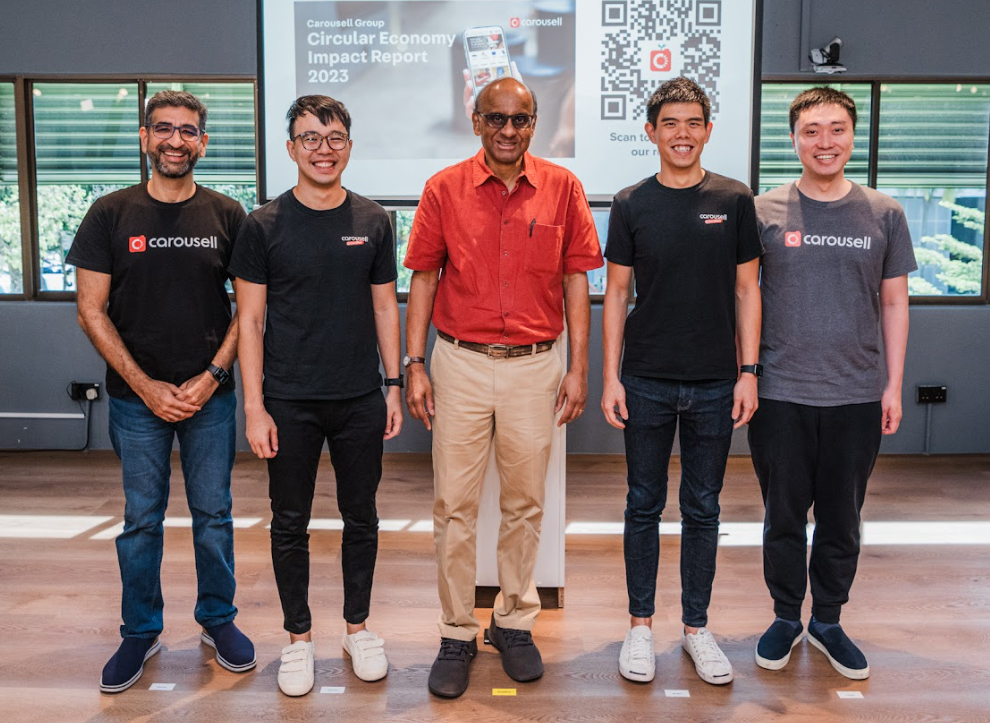How preloved things can save us all
Carousell Group releases inaugural Circular Economy Impact Report, showing that buying and selling secondhand items is a better choice for the planet
At A Glance
- 'Retail is responsible for 25 percent of global carbon emissions and with research continuing to show we're not on track to keep global warming below 1.5C, we're at a critical inflection point.'

Group; Marcus Tan, co-founder, Carousell Group; Tharman Shanmugaratnam, president of the
Republic of Singapore; Quek Siu Rui, co-founder and CEO, Carousell Group; Lucas Ngoo, co-founder,
Carousell Group
Carousell Group, a leading multi-category platform for secondhand in Greater Southeast Asia, has released its inaugural Circular Economy Impact Report, showing that buying and selling secondhand items is a better choice for the planet compared to traditional retail of buying new items. The report, a first-of-its kind for e-commerce and recommerce marketplaces in Southeast Asia, quantifies the Avoided Carbon Emissions due to users purchasing secondhand items on three of the groups’ marketplaces, in place of a new item.
The launch event early this month was graced by Tharman Shanmugaratnam, President of the Republic of Singapore, at Carousell Campus, the group’s regional headquarters. The launch event also invited various industry partners and investors where Carousell Group’s chief strategy officer Gaurav Bhasin gave a keynote presentation on key report findings.
Among the key findings of the Circular Economy Impact is that Carousell Group’s user community avoided 116,577 tonnes of carbon emissions in four goods categories—Fashion and Luxury, Electronics, Furniture, and Home Living, and Hobbies and Toys—in 2022. To put some context, carbon emissions of this magnitude are equivalent to flying one person 1.4 million times one-way between Davao to Manila.
It was also found that almost 56 percent of purchases on the Carousell marketplace displaced the purchase of a new item and that, on average, across Carousell marketplace’s six key markets, 55 percent of surveyed users reported an increase in the buying and selling of secondhand items in 2022 as compared to 2021.
“By facilitating secondhand transactions, Carousell Group holds a central role in advancing the circular economy alongside our users in the Greater Southeast Asia region,” said Bhasin. “As a key enabler of the circular economy in our region, we have a responsibility to lead by example and measure the potential positive impact of choosing secondhand products over new ones in a trustworthy and transparent way. In addition to the Avoided Emissions calculations, we have also taken the opportunity to calculate our group’s carbon footprint. The robustness of our chosen methodology underscores our strong commitment to sustainability, and it forms the bedrock of our sustainability endeavors.”
To quantify our impact, Carousell partnered with Vaayu, a European climate tech company leveraging proprietary AI and machine learning technology and utilizing its Life Cycle Assessment (LCA) database of over 600,000 product data points. As the initial phase of Carousell Group’s quantification journey, the scope of the report covers only the four goods categories of Carousell, Laku6, and REFASH. The group is committed to progressively incorporating all remaining categories and integrating other group brands Mudah.my, Chợ Tốt, and OneShift within the scope in the coming years.
“Retail is responsible for 25 percent of global carbon emissions and with research continuing to show we’re not on track to keep global warming below 1.5C, we’re at a critical inflection point,” said Namrata Sandhu, Vaayu co-founder and CEO. “Circular business models, like recommerce, offer a clear path to reducing retail’s impact on our planet, which is why we are so proud to partner with Carousell Group to quantify its climate impact and empower communications with their users.”
Besides the quantification of avoided emissions, the report also underscores the significance of every individual transaction in contributing to the overall circular economy impact. For instance, buying a secondhand sofa on Carousell can, on average, save up to 131 kg of Co2e, the equivalent of almost six trees absorbing Co2 per year.
As part of Carousell Group’s goal to accelerate the future of secondhand through recommerce, the group’s marketplaces have been rolling out a variety of recommerce programs and features across multiple platforms and markets this year.
“Our mission is to make secondhand the first choice for everyone. We have stayed true to this mission over the past 11 years, and we remain committed to making selling and buying secondhand even simpler, more trusted and convenient,” said Quek Siu Rui, Carousell Group co-founder and CEO. “With the release of the report, we hope more people realize how easy it is to embrace secondhand as a lifestyle and contribute to a greener world, without compromising on the things they enjoy.”